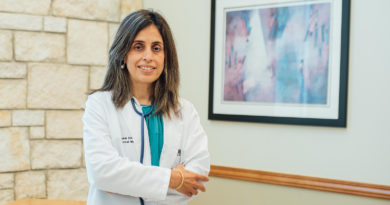Lifestyle Medicine: A New Approach to Healthy Living
By Lisa Davidson
Most doctor’s appointments end with a prescription for the pharmacy. At the Elms Creek Family & Urgent Care Clinic, patients often receive a prescription for a plant-based diet or 30 minutes of exercise.

Stephen Ralph, MD, is a board-certified internal medicine physician with a passion for promoting lifestyle changes to achieve optimal health.
“My interest in medicine dates back to my childhood as both my father and both grandfathers were general practitioner physicians in New York City,” says Dr. Ralph. “My grandfather lived in Brooklyn and his downstairs was entirely dedicated as a clinic which I would wander around as a child.”
During his college time, he decided that medicine was also his calling. Dr. Ralph was graduated from Fordham University and began his medical studies in 1979 at the University of Guadalajara in Mexico.
But Dr. Ralph didn’t only focus on his studies, he also accepted the Seventh-day Adventist faith during his time in Mexico. “Little did I know that this would have a huge influence on my outlook of medicine as the Seventh-day Adventists have a strong interest in leading a healthy lifestyle.”
The Adventist church started health studies in the 1990s, which demonstrated the life-extending benefits of leading a healthy lifestyle. The movement later established a university and medical school in Loma Linda, California.
“The Loma Linda campus has become the flagship center of the SDA health movement to this day and has grown into a large community,” Dr. Ralph says. “It was here that the American College of Lifestyle Medicine was born, which led to the creation of the American Board of Lifestyle Medicine.”
Dr. Ralph was among the first students to take the inaugural exam in 2017. After nearly 20 years as a physician, he incorporates the practices of lifestyle medicine more and more into his internal medicine practice — with positive results.
 Lifestyle medicine engages patients to a use a whole food, plant-predominant diet in combination with regular physical activity and healthy sleep habits. Other elements include positive social connections as well as stress management and the avoidance of risky substances.
Lifestyle medicine engages patients to a use a whole food, plant-predominant diet in combination with regular physical activity and healthy sleep habits. Other elements include positive social connections as well as stress management and the avoidance of risky substances.
“We would define lifestyle medicine as the therapeutic use of evidence-based lifestyle interventions to treat and prevent lifestyle-related diseases in a clinical setting,” Dr. Ralph says.
Statistics show how closely lifestyle choices and chronic diseases are connected and how they are preventable. “At least 70 percent of the chronic medical conditions that we treat are either directly or indirectly related to the lifestyle choices we make, the foods we eat, our sedentary lifestyle, inadequate sleep and harmful habits such as use of tobacco and alcohol,” Dr. Ralph says. “Lifestyle medicine empowers individuals with the knowledge and skills to make long-term behavior changes that address the underlying causes of many of these chronic conditions.”
Lifestyle medicine clinicians treat diseases with solutions such as nutrition counseling, recommendations for physical activity and the promotion of restorative sleep.
“Clinical research provides ample evidence for the preferential use of lifestyle interventions as a foundation in treating diseases,” he says.
While lifestyle medicine has been used as a preventive measure, it is now included in the treatment therapy. In some cases, lifestyle changes can not only treat medical conditions but even reverse chronic diseases.
“This represents a fundamental change in the way the medical establishment views lifestyle medicine,” Dr. Ralph says. “Medications are used to augment and support the lifestyle interventions, not to replace them. This is an important paradigm shift for the patient as they now begin to own their health and are much more motivated to make the intense behavioral changes that we recommend.”
Besides chronic diseases like hypertension and diabetes, lifestyle choices also can affect cancer rates. “A diet high in processed meats and animal fats has been linked to elevated cancer rates, particularly breast and colon,” Dr. Ralph says.
According to the Centers for Disease Control and Prevention, 93.3 million American adults were considered obese in 2016, which equals almost 40 percent of the adult population. “The real dilemma with the American diet is that we are getting too much of the wrong kinds of foods, particularly high amounts of animal fats and sugars,” Dr. Ralph says.
He recommends a diverse diet with higher quantities of fruits, vegetables and whole grains as well as legumes including different beans like split peas, lentils and a small handful of nuts daily. Supplements are not recommended, since they don’t offer the completely nutritional benefits of actual food.
Some of Dr. Ralph’s patients feel overwhelmed about making such radical changes.
“People should not be intimidated by feeling that they have to make all these changes at once,” he says. “Making changes over weeks and months have increasing benefits. It’s not an all-or-nothing endeavor. I always support people where they are, encourage them to make the easy changes first and work on the more difficult ones little by little. As long as we’re moving in the right direction, we gain increasing benefits along the way.”




